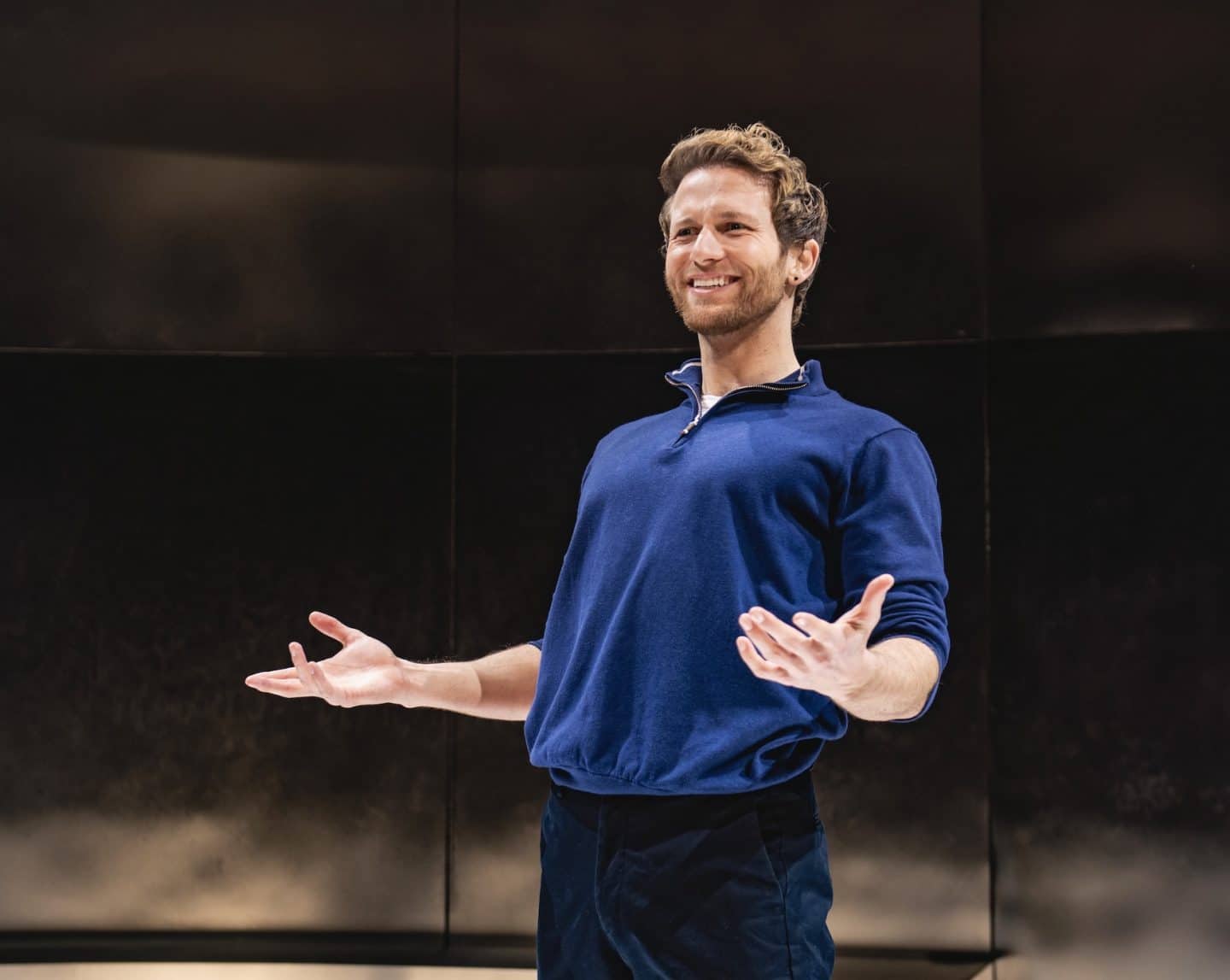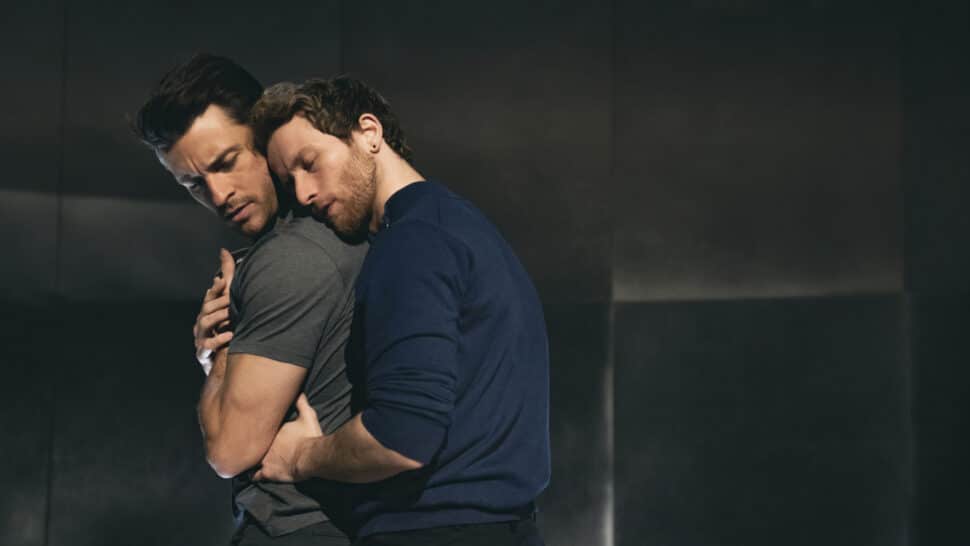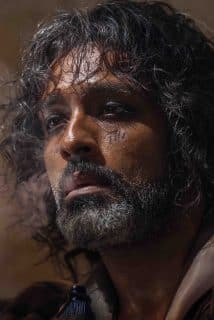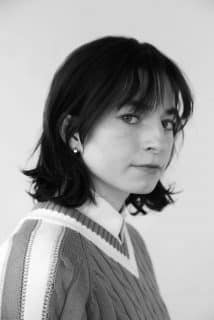Joel Harper-Jackson is seizing his chance
Culture
Joel Harper-Jackson had to step into Taron Egerton's shoes after Taron collapsed on-stage during a performance of 'Cock. As we find out in this interview, Joel is taking his big opportunity...
Joel Harper-Jackson recently leapt into the public consciousness after Taron Egerton collapsed on-stage during a performance of ‘Cock’ and his understudy, Joel, had to step into the limelight as the character ‘M’; a role he has retained after Taron pulled completely out of the production due to personal issues. All of which made for good paper headlines for a few weeks, especially when linked to a play with such a title. But in fact, now that the gossip has died down, what we’re left with is a new star in the making: Joel has been receiving wide acclaim for his performance in the Mike Bartlett play (and despite London Underground taking down its posters recently, this is a highly respected play which first debuted in 2009). And, as we find out in this in-depth interview, it came at a time when Shropshire-born Joel had almost given up on acting, a combination of coming from a musical theatre background and the dearth of work during COVID, conspiring to leave him in a difficult place. Instead, having accepted the chance to be an understudy for Cock, he suddenly found himself the centre of attention and on a vertical ascent. We spoke to him to find out how this unexpected ride was going…
How are things with you, Joel?
It’s just been crazy. A really mad couple of months, but I feel like it’s finally starting to settle down a little bit. I felt for a while I was treading water, trying to do everything that the show requires, and having rehearsals in the daytime, and then on top of that, doing interviews, and then, you know, your life, on top of all of those things.
I really wasn’t expecting this to happen, obviously. We all had two years off because of COVID, and I thought I’d take this understudy position because it’ll be a nice little introduction back into theatre and I’ll be sat in the dressing room for the majority of it. So I wasn’t really prepared for it. But in these situations, you just kind of have to go, ‘well, this is an amazing opportunity, I have to go grab it, make the most of it and try and enjoy it.’ At times it has been stressful, but you have to look at the big picture: How amazing is this? When will this kind of opportunity come again?
Can you can you tell us about the play first of all, just for people who don’t know it?
Well, the play is called ‘Cock’. It’s a Mike Bartlett play, and it begins with a gay couple. Well, what one of them assumes is a gay couple. They’ve been together for about seven years, and as with relationships, things start to get a little stale. Respect can disappear. And the character John [played by Jonathan Bailey], decides to leave my character, ‘M’. And in that time, when they’re on this little break, John bumps into this woman – they always see each other on the on the train platform, but they strike up conversation, and continue on talking, and one thing leads to another and eventually they have sex. And this kind of blows John’s mind because he thinks he’s gay, but all of a sudden has feelings for a woman and then he starts to question his whole life for the past however many years that he’s been out. He gets a little bit shocked by this and goes back to his original partner, M, and tells him what he’s done, and it turns into a bit of a comedy. But laced within that there’s obviously a lot of pain and a lot of sadness. And for something that is so hilarious, I feel like it ends quite ugly. No one comes out of this looking very good. I guess it’s about sexual identity, sexuality, labels, and whether they are necessary in today’s society. I think it’s very relevant now, and I think it’s something that needs to be watched and discussed.
It first debuted in 2009, but it must be resonating with people more than ever now…
Yeah. Sexuality seems to be evolving at such a pace, like even in the past couple of years we’re having more conversations. People seem to be becoming more open-minded, I guess. Labels can really limit you, and I hope one day that they won’t be necessary, that people can just be people and there’s not a need for announcing you’re coming out. People can just like who they like. But certainly it’s constantly evolving sexuality, and you have more people coming to realise that it isn’t actually black and white, that it’s a lovely spectrum. I think personally, if there was no stigma attached to homosexuality, more people would be open to it. If it was never a thing, and was just completely accepted in society, more people would be. I think it’s simply fear and things that have gone on in the past that are putting people off even exploring the idea.
And if that was the case, there’d be less people feeling ashamed or having to go through all those difficulties because of what society puts on them. I came out when I was 11, so I’ve been out for about 19 years now. It’s just completely a part of who I am, and I find it quite baffling that society is still making us have these conversations. I don’t really see why anyone has a problem with it, why people feel the need to make other people feel wrong for it. This country’s not too bad, but I mean, certain parts of the world, it’s just absolutely ludicrous. No one’s hurting anyone. It’s such a shame that people are having to go through shame and embarrassment.

Art can be a great way to explore these things and play them out – is that what the play does, put the issues back into a human level through drama?
Yeah, I think so., I feel like it’s a challenge returned to the audience and their views on sexuality, night by night. Phil Daniels plays my dad and he does a speech which is so liberal it’s almost right wing. Very regimented. About how ‘sexuality is simply down to the chemicals in your brain, they go one way and you like girls, they go the other way and you like men. It’s how you’re born. It’s in your genetics.’ And some people react with a round of applause to what he was saying. Then we’ve had another occasion where a woman actually started heckling, and saying, this is ridiculous. It’s just incredible that the show is sparked such conversations and people are really divided in it. Some people think it’s genetic, and other people think it simply evolves with what you experience in your life. I think it’s really lovely to be a part of a play which sparks such a conversation, because hopefully, that’s how we evolve and get better.
It’s amazing that you can see that reaction happening in the room, that must keep it incredibly fresh and exciting?
Exciting, sometimes scary. That’s the thing with the show, the audience really is the fifth character. And they bring something so different to it every night, the play changes every night depending on what they do, as well as us. But yeah, it’s really lovely and slightly scary to be right on the front line and have someone going right back at you.
Can you tell us the moment when you had to step into Taron’s shoes that night?
I didn’t really have much time to process it. All the understudies were in the dressing room just behind the stage, listening to the show over the tannoy. And it got to about an hour and 10 minutes into the show, and then we heard something go slightly awry with the script and then a big pause. And then Phil Daniels asked for a paramedic. So lots of commotion when we didn’t really know what was going on. Ten minutes passed and someone from stage management came into our dressing room and said, ‘Taron has collapsed. He’s okay. He’s been checked over by a paramedic that was in the audience. But he’s okay.’ So I was like, ‘Okay, cool, no problem, he’s going to be fine.’ Although we were all slightly looking over our scripts. Another ten minutes passed, and then they said, ‘Would you just mind getting into your costume, just in case, as a precaution?’ And then they came back again, and said, ‘Okay, we’re actually going to put you on, we just think it’s the right thing to do, for you to go on with the script.’
People went into panic stations a bit, with the cast wanting to run lines in the dressing room, but in doing that they were actually dropping lines themselves. I think in those kinds of situations I have learned the more that you stress out, it just gets in the way. You have focus on the task at hand, and crack on. I was like, ‘we’re perfectly capable of doing this.’ I got onto the stage and the curtain was still down and I was holding my scripts, and I felt like it was getting in the way and I was like, ‘I feel like I’ve got this, you know’, so I just put it on the side and fortunately, everything was in there.
In the audience when the curtain came up to reveal me, as we all sat around the dinner table, it was just electric, they were so supportive. That’s the lovely thing about theatre audiences, they really rally behind you. So it was fantastic. Then the next thing, you know, I’m off stage and in the bar having a little drink.
What kind of things have you have you kind of learned from this?
One of them is to keep your mouth shut. I’ve always been quite outspoken. If I don’t like something, I’ll say it. But I’ve learned to stay quiet, and let everything sort itself out. Lots of stagecraft as well, just from being with these actors. I’ve learned that I’m a lot more capable than I thought I ever was, that I am quite resilient. Also that you can do anything you put your mind to – I felt like I knew that anyway, but I’ve never really had it proved.
Also, when you are feeling stressed, take time for yourself. You always have to make sure you have a good amount of play through all the hard work, because going into it because then this job becomes a job. And that’s an awful thing. Because you know, we don’t do this job for the money, we do it for the love.

Have you always been quite sort of attuned to your mental health and the way that you sort of manage your yourself?
The majority of my family have had mental health problems. Both my parents had mental health problems when I was about 19-20. I looked after both of them when they had breakdowns. My sister has always suffered with mental health too, so I’ve always been surrounded by it. To experience my parents having this moment where I literally couldn’t do anything for them, I couldn’t get them out of bed, I couldn’t make anything better, I kind of turned into the parent and I had no other option but to carry on and not think about how I felt.
For a good few years I suppressed things and would be like, ‘it doesn’t matter’ and go out and get absolutely obliterated, and not even realise that that’s actually a problem. Really, it was a coping mechanism. I guess it’s only in probably the past four or five years, and certainly during COVID, that I’ve had a moment of reassessing, like everybody, about what we are and who we are and why we are. I think it’s gotten better, where I spoke about things more with people and kind of seen it was a problem, all those years ago, I just didn’t realise it. It’s a very northern thing to do as well.
Can you tell us a bit more about how you re-set your mindset for your career, and what you wanted to achieve?
I had a real wobble in the pandemic. I was getting nothing through, but no one was, jobs were so scarce. The industry is overpopulated as it is, and there was just nothing. So I really thought that was it. That’s why I was quite happy to take this understudy position, because I’d be in the background, and just get to watch and learn and it’ll be a nice steady easing back in.
But I am so ambitious, there’s so much that I want to achieve, and I just didn’t really feel like I was even scratching the surface of what I wanted to do. So it was hard because I didn’t think that I could achieve it, I was having a real confidence crisis.
See these photos behind me? [points to a wall of images behind him on the Zoom call], I have a vision board, which is what I want to achieve in life. And it’s completely full with my favourite actors and an Oscar and an Olivier and my dream house and all these things. At that point, I’d lost all of my money because of the pandemic, I’d fallen out with my best friend, and then I had to move back in with my mum, and on the dole. I was on a good path in my career and then the pandemic just obliterated it. I thought, ‘what am I going to do now?’ And then click to what’s happening now…
You know when your camera roll on your phone shows you all your pictures from the same day in the past? I was on it yesterday, and it showed what I was doing last year. I was working in a COVID testing site, and really low, and then just cut to what’s happening now. It shows you how quickly life can change in this industry. You can lose the faith but if you keep on working hard and trying to keep yourself afloat, eventually it will pay off and it will happen.
Who are some of the actors you’ve got on your wall who you want to emulate?
Funnily enough, I actually got to meet one the other day: Sir Ian McKellen. He came to watch the show and I got to meet him. You know when people are like, ‘Okay, you’re having a dinner party, you can invite six people dead or alive. Who would it be?’ I always said him. Not simply because it’s his acting, which I greatly admire, and it’s my absolute dream to be in a Marvel franchise like he has, but it was his activism, that’s what I can remember when I was a teenager.
What was he like?
He was so lovely. When I was 18-19 I actually wrote to him because I got offered a place at drama school, and I couldn’t afford it because I didn’t come from money. When I’d auditioned they’d already given out all the scholarships. I wrote to him because I’d heard that he gives out like funds for people every year. I told him this, ‘I actually wrote to you,’ he was like, ‘Were you asking for money?’ I said I was, and he’s like, ‘Well, you should have sent a picture then shouldn’t you.’ I said I did actually and he said, ‘Oh dear.’ But he was really lovely properly supportive and just chatting about my life.
Also Hugh Jackman is up there because I think he’s fantastic, and he came from musical theatre. And that’s the majority of my background. Not many people started in musical theatre and then hit the big time, it’s not really done. So him and Luke Evans and Daniel Craig. It’s just a nice little daily reminder to look at and see that’s what you’re aiming for. And the more that you start to believe it and visualise it and think you can do it, your energy shifts, and you start to manoeuvre the world differently. I feel like if you really start to think that you can do that, things start to mould around you and what you think you could be.
Finally, why should people see Cock?
I think it challenges a lot of people’s perception on labels and sexuality. So I think it’s a really important thing to come and see now. But aside from all that, it’s just a brilliant play. Before I was even involved in it, I was like, I don’t care if I don’t get this, I cannot wait to watch this show. It’s so funny, but with real moments of painful ugliness. And it’s just been beautifully directed by Marianne Elliott. I think it’s a really wonderful show to come see right now.
Follow Joel on Instagram:
Trending

Join The Book of Man
Sign up to our daily newsletters to join the frontline of the revolution in masculinity.

















